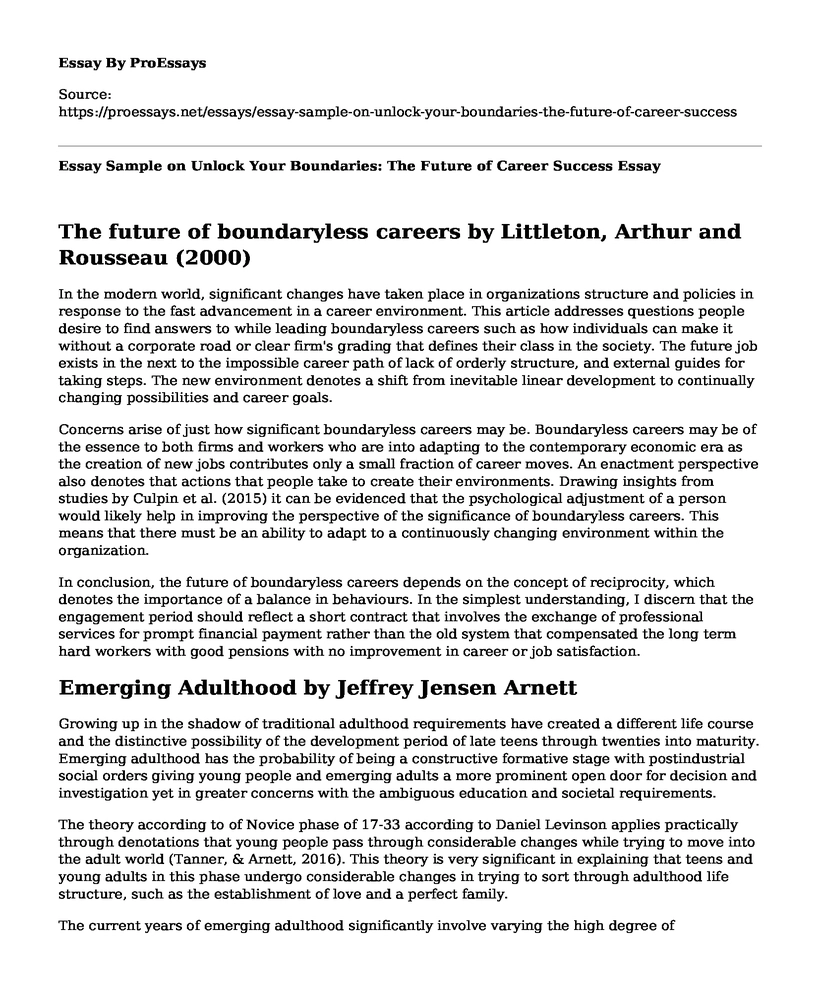The future of boundaryless careers by Littleton, Arthur and Rousseau (2000)
In the modern world, significant changes have taken place in organizations structure and policies in response to the fast advancement in a career environment. This article addresses questions people desire to find answers to while leading boundaryless careers such as how individuals can make it without a corporate road or clear firm's grading that defines their class in the society. The future job exists in the next to the impossible career path of lack of orderly structure, and external guides for taking steps. The new environment denotes a shift from inevitable linear development to continually changing possibilities and career goals.
Concerns arise of just how significant boundaryless careers may be. Boundaryless careers may be of the essence to both firms and workers who are into adapting to the contemporary economic era as the creation of new jobs contributes only a small fraction of career moves. An enactment perspective also denotes that actions that people take to create their environments. Drawing insights from studies by Culpin et al. (2015) it can be evidenced that the psychological adjustment of a person would likely help in improving the perspective of the significance of boundaryless careers. This means that there must be an ability to adapt to a continuously changing environment within the organization.
In conclusion, the future of boundaryless careers depends on the concept of reciprocity, which denotes the importance of a balance in behaviours. In the simplest understanding, I discern that the engagement period should reflect a short contract that involves the exchange of professional services for prompt financial payment rather than the old system that compensated the long term hard workers with good pensions with no improvement in career or job satisfaction.
Emerging Adulthood by Jeffrey Jensen Arnett
Growing up in the shadow of traditional adulthood requirements have created a different life course and the distinctive possibility of the development period of late teens through twenties into maturity. Emerging adulthood has the probability of being a constructive formative stage with postindustrial social orders giving young people and emerging adults a more prominent open door for decision and investigation yet in greater concerns with the ambiguous education and societal requirements.
The theory according to of Novice phase of 17-33 according to Daniel Levinson applies practically through denotations that young people pass through considerable changes while trying to move into the adult world (Tanner, & Arnett, 2016). This theory is very significant in explaining that teens and young adults in this phase undergo considerable changes in trying to sort through adulthood life structure, such as the establishment of love and a perfect family.
The current years of emerging adulthood significantly involve varying the high degree of demographic diversity and instabilities that reflect the prominence of change and exploration. The transition of teenagers into adulthood, however, is not entirely affected by the ever-changing modern perspectives but also influenced by identities such as love for a stable, happy relationship, work for financial independence and world views such as being identified in a particular social class.
Conclusion
In conclusion, the changes in the phase of transition from teenage through the twenties to adulthood opens up possibilities for both economic and social development. Therefore, this fact is not going to change any time soon that emerging adulthood is the most significant times of young people as it is characterized by opportunities of diversities and explorations.
References
Arnett, J. J. (2000). Emerging adulthood: A theory of development from the late teens through the twenties. American psychologist, 55(5), 469.
Culpin, V., Millar, C., Peters, K., Lyons, S. T., Schweitzer, L., & Ng, E. S. (2015). How have careers changed? An investigation of changing career patterns across four generations. Journal of Managerial Psychology. Retrieved from: https://www.emerald.com/insight/content/doi/10.1108/JMP-07-2014-0210/full/html
Grant-Vallone, E. J., & Ensher, E. A. (2017). Re-crafting careers for mid-career faculty: A qualitative study. Journal of Higher Education Theory and Practice, 17(5).
Littleton, S. M., Arthur, M. B., & Rousseau, D. M. (2000). The future of boundaryless careers. The future of career, 101-114.
Tanner, J. L., & Arnett, J. J. (2016). The emergence of emerging adulthood: The new life stage between adolescence and young adulthood. In Routledge Handbook of Youth and Young Adulthood (pp. 50-56). Routledge.
Wang, M., Olson, D. A., & Shultz, K. S. (2012). Mid and late career issues: An integrative perspective. Routledge.
Cite this page
Essay Sample on Unlock Your Boundaries: The Future of Career Success. (2023, Jan 29). Retrieved from https://proessays.net/essays/essay-sample-on-unlock-your-boundaries-the-future-of-career-success
If you are the original author of this essay and no longer wish to have it published on the ProEssays website, please click below to request its removal:
- Music Therapy and Effects of Music on Psychological and Mental Health
- The New Data From the Interview Responses HR Paper Example
- Essay Sample on Future Goals
- Essay Sample on Job Satisfaction & Organizational Commitment: Distinct Yet Related
- Group Dynamics: Key to Achieving Diversity, Productivity & Quality in Organizations - Essay Sample
- ADHD: Impairment in Brain Development & Action - Research Paper
- Finding Happiness: Achieving Balance Between Positive and Negative Emotions - Essay Sample







